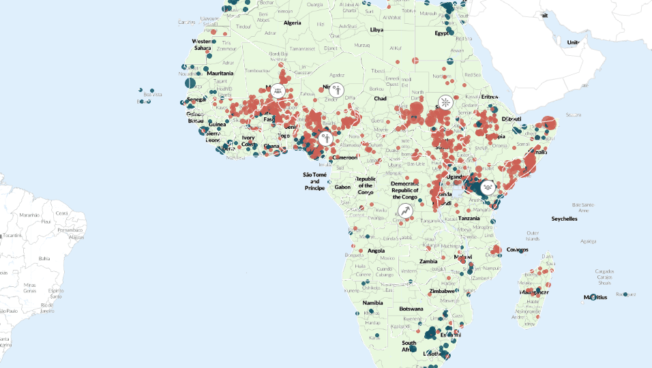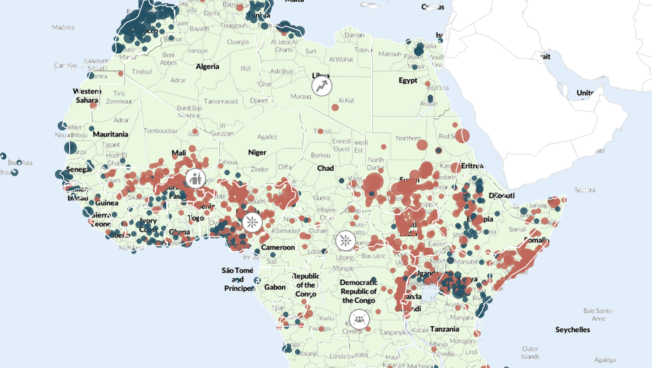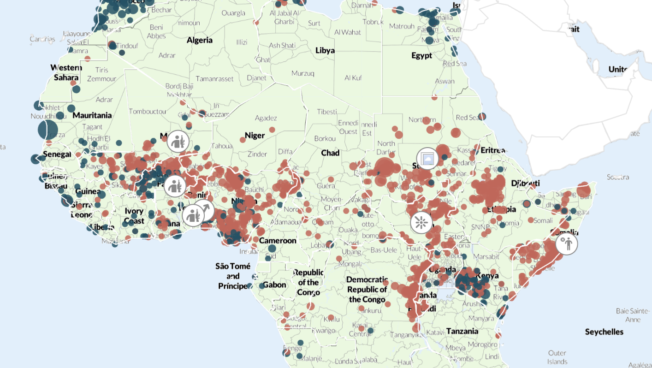Regional Overview
Africa
May 2024
Posted: 10 June 2024
In this Regional Overview
- Burkina Faso: Escalating JNIM and military operations lead to deadliest month of 2024
- Democratic Republic of the Congo: Violence involving M23 increases in South Kivu
- Libya: Demonstrations spike over economic and security conditions
- South Africa: Unrest rises in Gauteng ahead of 29 May elections
- Sudan: Fatal violence continues in North Darfur
Burkina Faso: Escalating JNIM and military operations lead to deadliest month of 2024
Reported fatalities rose in Burkina Faso for the second consecutive month amid an escalation in the conflict between the al-Qaeda-affiliated Jama’at Nusrat al-Islam wal-Muslimin (JNIM) and government troops. Across the country, more than 900 people were reportedly killed, making May the deadliest month since April 2023. Civilians were targeted on numerous occasions by both sides, often under the accusation of being suspected collaborators of opposing forces. Soldiers were accused of killing over 270 civilians in several villages in Yagha and Komondjari provinces, contributing to the military forces being the deadliest perpetrator of violence toward civilians in May. For its part, JNIM continued to retaliate against communities accused of associating with or supporting the Volunteers for the Defense of the Homeland (VDP), engaging in dispersed mass attacks to avoid air and drone strikes by state forces.
Democratic Republic of the Congo: Violence involving M23 increases in South Kivu
While international headlines focused on a failed coup attempt in Kinshasa,1The Economist, ‘A live-streamed attempted coup in Congo shakes the region,’ 23 May 2024 the M23 insurgency moved southward into South Kivu province and led to an overall rise in political violence in the province compared to April. In South Kivu, the M23 rebel group was active primarily in Kalehe, Bukavu, and Fizi territories, with contestation around Bukavu potentially cutting one of the few remaining supply roads to Goma on the Congolese side of the border and creating a strategic supply corridor for M23 from Rwanda.2RFI, ‘RDC: au Nord-Kivu, l’offensive des FARDC contre le M23 se poursuit,’ 25 May 2024 Numerous operations in South Kivu by the M23 involved the shelling of various localities — continuing an ongoing trend of elevated remote violence by M23 and supporting Rwandan military forces (RDF) since January in the country (for more, see Rwanda-backed M23 Rebels Advance Toward Goma in Eastern DR Congo). Concerningly, several explosives fired by the M23 and RDF in South Kivu struck civilians, reportedly killing around 10 people.
Libya: Demonstrations spike over economic and security conditions
Demonstrations surged last month in Libya, with many gathering in public spaces against the perceived deterioration of the country’s economic and security situation. ACLED records dozens of events throughout the country and the highest monthly level of demonstrations since December 2021. Most demonstrations remained peaceful and centered in western Libya, highest in Nuqat al-Khams, Misratah, and Tripoli districts. In Nuqat al-Khams, residents mobilized against outbreaks of violence in the area and called on the Tripoli-based Government of National Unity (GNU) to withdraw all nonlocal armed groups from their villages.3Libya Security Monitor, ‘Fighting breaks out in al-Jamail as protests urge gnu to withdraw militias,’ 6 May 2024 Armed groups in Nuqat al-Khams targeted civilians on several occasions in recent months. Among them is the mayor of Zaltan, who was abducted and released after a few hours on 23 April.4Al Wasat, ‘The mayor of Zalten Municipal Council was released hours after his kidnapping,’ 23 April 2024 Several demonstrations also broke out following attempts by a local armed group in Misratah to thwart an investigation by the Public Prosecution into a case of attempted smuggling of gold from the city’s airport.5Al Wasat, ‘Citizens in Misrata protest against the “attempted abduction of a prosecutor,”’ 15 May 2024
South Africa: Unrest rises in Gauteng ahead of 29 May elections
As South Africans went to the polls on 29 May for national and provincial parliamentary elections, demonstrations rose in Gauteng province from April. Gauteng has the highest number of registered voters — 24% of the electorate6 South Africa Electoral Commission, ‘Voter registration statistics,’ 28 May 2024 — and is a province where the ruling African National Congress (ANC) party faces declining support in recent polling.7Daily Maverick, ‘Where South Africa’s crunch election will be won and lost,’ 28 May 2024 Labor-related demonstrations were a key driver of popular mobilization, with demonstrators voicing concerns over economic decline, unemployment, and poor public service conditions.8John Eligon, ‘South Africa’s 2024 National Election: What to Know,’ New York Times, 18 April 2024; Kopano Gumbi and Joe Bavier, ‘South Africa’s record unemployment strains social welfare as ANC face voter decline,’ Reuters, 10 May 2024; John Authers, ‘South Africa’s Economy Is Deeply Troubled. It Could Get Worse,’ Bloomberg, 15 May 2024 Several political opposition groups also gathered to challenge the electoral processes, specific legislation, and judicial decisions. Demonstrations were concentrated in the metropolitan municipality of Johannesburg, the economic and financial hub of the country and home to the ANC party headquarters.9Renée Bonorchis, ‘City showdown: Crumbling Joburg is still where the money’s at, but Cape Town is catching up,’ News 24, 9 March 2024 A particularly large group of over 100,000 uMkhonto weSizwe (MK) party supporters gathered on 10 May, voicing grievances over bias in the electoral commission for considering the removal of MK party leader, former President Jacob Zuma.10Thabiso Goba, ‘Some MK Party supporters accuse IEC of bias in Zuma case,’ Eyewitness News, 10 May 2024 Later, the Constitutional Court in Johannesburg ruled that Zuma’s criminal conviction disqualified him from candidacy.11Lynsey Chutel, ‘South Africa’s Highest Court Says Jacob Zuma Can’t Serve in Parliament,’ New York Times, 20 May 2024
Sudan: Fatal violence continues in North Darfur
In North Darfur state, deadly battles continued last month between the paramilitary Rapid Support Forces (RSF) and Sudanese Armed Forces (SAF), both fighting alongside a rising number of allied armed groups (for more, see Sudan: The RSF sets its eyes on North Darfur). Battles last month in North Darfur were especially deadly, increasing from the month prior with reported fatalities eclipsing 200.12Sudan War Monitor, ‘Darfur movements coordinate war plans against RSF,’ 3 May 2024 The RSF moved on to encircle El Fasher, the last state capital held by the SAF in Darfur. Concerningly, some of the fighting took place in the Abu Shouk internally displaced persons camp, home to many civilians who fled from previous rounds of conflict in Sudan.13Ahmed Gouja, ‘How El Fasher went from Darfur’s safe haven to all-out war,’ The New Humanitarian, 29 May 2024 The reported use of heavy artillery by both parties has left civilians in danger of being caught in the crossfire, with at least 100 civilians reportedly killed in the fighting. The United Nations officials have warned that a full-scale offensive on the besieged city may precipitate the humanitarian situation for millions of Sudanese14Al Jazeera, ‘‘Hell on Earth’ as violence escalates in Sudan’s el-Fasher,’ 17 May 2024 and highlighted that Darfur is facing a growing risk of genocide.15BBC, ‘World ignoring risk of Sudan genocide – UN expert,’ 24 May 2024
See More
See the Codebook and the User Guide for an overview of ACLED’s core methodology. For additional documentation, check the Knowledge Base. Region-specific methodology briefs can be accessed below.
Links:
For additional resources and in-depth updates on the latest political violence and protest trends, check our local observatories for Mozambique and Ethiopia, as well as our special Nigeria Election Violence Tracker project.







